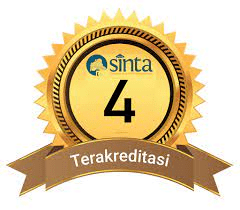Determinan Sikap Dalam Penggunaan Sistem Keuangan Desa (Siskeudes)
Abstract
SISKEUDES application is an application developed by BPKP to improve the quality of village financial governance that must be implemented. The implementation of regulations, the success of the purpose of the application of SISKEUDES will determine the effectiveness of the system. The successful implementation of the system is seen from the attitude of the village government in using the system. This research aims to test the perception of usability, perception of ease of use, subjective norms, and complementary to the attitude of use of rural financial system (SISKEUDES) applications. This study used survey methods and took samples in the village government of Madiun Regency and Kediri Regency which positioned as users of SISKEUDES application as many as 230 respondents. Data that has been disseminated through questionnaires is analyzed using partial least square (PLS) based structural models with SmartPLS software version 2.0. The results of this study prove that the user attitude of SISKEUDES application is positively influenced by perception of usability, subjective norms, and compatibility in using SISKEUDES applications. The study found the perception of ease of use had no effect on the attitudes of SISKEUDES application users.
Keywords; Perception of Usability; Perception of Ease of Use; Subjective Norms; Compatibility; Attitude
Keywords
Full Text:
PDFReferences
Abdillah, W., dan Jogiyanto, H. 2015. Partial Least Square (PLS). Yogyakarta: C.V. Andi Offset.
Agag, G., dan El-Masry, A. 2016. Understanding Consumer Interntion to Participate in Online Travel Community and Effect Consumer Interntion to Purchase Travel Online and WOM: An Integration of Innovation Diffusion Theory and TAM with Trust. Elsevier. Computers in Human Behaviour. 60, 97-111.
Amaro, S., dan Duarte, P. 2015. An Integrative Model of Consumers Intentions to Purchase Travel Online. Elsevier. Tourism Management. 46, 64-79.
Ajzen, I. 1991. The Theory of Planned Behaviour. Organizational Behaviour and Human Decision Processes, 50(2), 179-211.
Ajzen, I. dan Fishbein,. M. 1975. Belief, Attitude, Intention and Behaviour: An Introduction to Theory and Research. Reading, Mass, Adisson-Wesley Pub. Co.
Ayeh, J.K., Norman., Rob L. 2013. Predicting The Intention To Use Consumer Generated Media For Travel Planning. Elsevier. Tourism Management. 35, 132-143.
Budiman, F. & Arza I.F. 2013. Pendekatan Technology Acceptance Model Dalam Kesuksesan Implementasi Sistem Informasi Manajemen Daerah. Jurnal WRA, Vol. No. 1. H. 87-110.
Chau P.Y.K. dan Paul, J.H. 2001. Information Technology Acceptance by Individual Professionals: A Model Comparison Approah. Decision Sciences. Vol. 32 (4), 699-719.
Cho, V. 2006. A Study Of The Roles Of Trusts and Risks In Information – Oriented Online Legal Services Using an Integrated Model. Information & Management Vol. 43, 502-520.
Damasiotis, Vyron, Panagiotis T., Illias S., Sotiris N.& Evdokia T. 2015. IT Competences for Proffesional Accountants. A Review. Procedia-Social and Behavioral Sciences, 175 (2015) 537-55.
Davis F.D. 1989. Perceived Usefulness, Perceived Ease Of Use And User Acceptance Of Information Technology, MIS Quarterly. ABI/Inform Global. Management Science, Vol.13, No. 3, H. 319-340.
Davis F.D., Richard P. B., & Warshaw P. R. 1989. User Acceptance of Computer Technology: A Comparison of Two Theoritical Models. ABI/Inform Global. Management Science, 982.
Hartono, Jogiyanto. 2007. Sistem Informasi Keperilakuan. Yogyakarta: C.V. Andi Offset.
http://www.bpkp.go.id/ diakses bulan Januari 2018.
http://www.madiunkab.go.id/ diakses bulan Januari 2018.
Imran, M., Darwanis & Arfan M. 2014. “Pengaruh Kemudahan Penggunaan Sistem Kemanfaatan Sistem dan Keahlian Komputer Terhadap Efektivitas Sistem Pengelolaan Keuangan Daerah di Pemerintahan Kota Banda Aceh”. Jurnal Magister Akuntansi Pascasarjana Universitas Syiah Kuala, Vol. 3, No. 4, H. 54-65.
Iswahyudi, M. 2017. “Determinan Sikap Pemerintah Desa Dalam Menggunakan Sistem E-Village Budgeting”. Tesis. Program Magister Akuntansi Universitas Brawijaya: Malang.
Jan, Alberto Un., & Contreras, Vilma. 2011. Technology Acceptance Model for The Use of Information Technology in Universities. Elsevier. Computers in Human Behaviour. 27, 845-851.
Lin. 2007. Predicting Consumer Intentions To Shop Online: an Empirical Test of Competing Theories. Journal of Electronic Commerce Research And Applications 6: 422-433.
Malhotra, Y., dan Galleta, D.F. 1999. Extending the Technology Acceptance Model to Account for Social Influence Theoritical Bases and Emirical Validation. Proceedings of the 32nd Hawaii International Conference on System Sciences. 1-11.
Article Metrics
Abstract has been read : 728 timesPDF file viewed/downloaded: 0 times
DOI: http://doi.org/10.25273/inventory.v4i2.7673
Refbacks
- There are currently no refbacks.
Copyright (c) 2020 Dinda Amelia Kusumastuti, Rihan Mustafa Zahri

This work is licensed under a Creative Commons Attribution-ShareAlike 4.0 International License.
Indexed by:
Supported by:
Editorial Office:
Universitas PGRI Madiun
Kampus 3 Lantai 2 Program Studi Akuntansi
Fakultas Ekonomi dan Bisnis
Jl. Auri no. 14-16 Madiun








